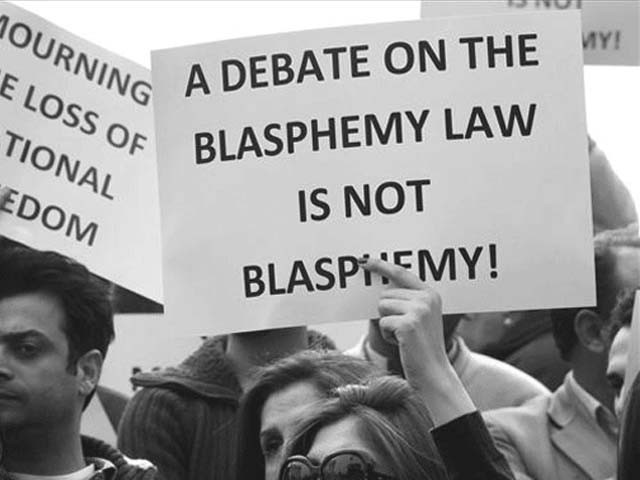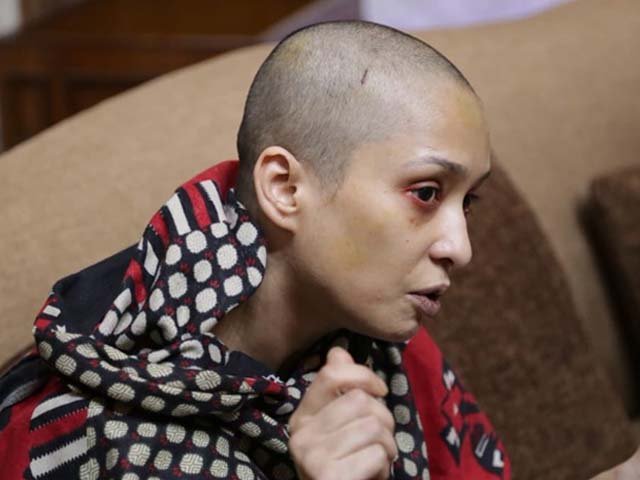
Australian One Nation party leader Senator Pauline Hanson pulls off a burka at Parliament House yesterday. PHOTO: REUTERS
Pauline Hanson’s burqa ban proves she is an isolationist and the female version of Donald Trump – but only worse
Hanson is not new to controversy and is quite vocal about her right-wing, anti-immigration and anti-Muslim rhetoric.
The Australian senate witnessed unusual scenes yesterday when a woman walked in wearing a burqa for the first time in its history.
The footage shows gasps of ‘what on earth!’ from senators as the woman revealed herself to be Pauline Hanson, a senator from Queensland and the head of the One Nation Party.
Revelling in the attention, she bared her smug face to advocate a ban on burqas in Australia and its parliament. She called it oppressive, un-Australian and a threat to security and western society, and asked the leader in the senate, Attorney General George Brandis, whether he will work to ban it.
Her address in the dress up was passionately dressed down by Brandis who called it an “appalling stunt” and warned her to be “very, very careful” of offending the “religious sensibilities of other Australians”. He wasn’t alone. Similar views and condemnations have followed since from the public majority and the prime minister himself.
 Photo: Screenshot
Photo: ScreenshotHanson is not new to controversy and is quite vocal about her right-wing, anti-immigration, anti-Muslim and anti-abortion rhetoric. She stands with white nationalists to ban halal meat and mosques and laments that Australia has been ‘swamped’ by Asians and Muslims. To put it simply, she is an isolationist and the female version of Donald Trump – only worse. Her bigotry is not new to Australian politics but this time, she stepped on too many toes at once.
https://twitter.com/JohnJohnsonson/status/898038100139442176
The garment has been under frequent debate over the years and its use, or lack thereof, holds symbolic value for many other underlying issues.
Hanson considers the burqa oppressive because women are forced to wear it. I wonder how many Muslim women has she met to make such an opinion and state it as a matter of fact in the senate. Such generalisations discredit many women who wear it out of their own will and strip them of their agency. No decision can be forced upon an individual, whether it is forceful donning of the burqa or banning its use. What an individual decides to wear has to be their own choice. And that right of choice cannot be legislated upon by politicians or forced upon by patriarchy.
If women’s oppression is a real concern for the right as they propagate in the burqa debate, they ought to advocate for a woman’s right to choose instead of taking away from that agency through the burqa ban. Otherwise, it will be hard to differentiate between Saudi Arabia’s patriarchy that forces a burqa on, and Hanson’s right-wing rhetoric that forces a burqa off. And in all this, the only thing that will be lost is an individual’s freedom of choice.
Sparking the useless burqa debate propels women to the centre in a battle between the right and left. For centuries, women have been used to fight and win battles as commodities. Historically, they were subdued and raped to win colonies or gain independence. Now, they are expected to patiently listen and participate in debates between the ideological left and right over what they can and cannot wear.
Such debates are worse for Muslim women in particular. They already face discrimination and racist attacks due to their faith, lifestyle, food and choice of garments, and then are also expected to defend the values they hold. This ideological battle once again uses and dehumanises women to prove their point. Here, one should recall the racism the Australian broadcasting presenter Yassmin Abdel-Magied had to face as a Muslim woman who chose to wear a headscarf. She was called a raghead and hunted down by racists until she decided to leave Australia and move to the UK.
Therefore, Hanson’s attack on the burqa is an attack on the entire Islamic faith, Muslims and an attempt of cultural appropriation.
But the Australian Muslim Women’s Association president Silma Ihram echoed the same views. Whilst commenting on Hanson’s burqa stunt, she said,
“Burqa is not universally popular amongst Muslim community, but there are many more pressing issues in terms of security than the burqa.”
Many of my Australia-based Pakistani friends are asked by Australians here whether they wear the burqa in Pakistan and if it is as commonly worn as perceived to be.
The West sees it from a binary lens whereby it considers all Muslims prefer such head-to-toe coverings. It conveniently forgets the dynamic and multi-cultural web of individuals – from the orthodox Saudi Arabia to the secular Turkey. But the burqa is considered integral to the Muslim faith through a western binary lens. Thus, when Hanson called the burqa a security threat, she further marginalised the Muslim population in Australia and the West, and exposed her own hypocrisy. Women are already disadvantaged due to patriarchal structures; attacking their faith and attire will further marginalise them in a white, male-dominated country like Australia.
https://twitter.com/LyonBeau/status/898052109806911493
In her speech, Hanson mentioned that the burqa limits women’s assimilation and job prospects. Needless to say, if a woman is disadvantaged due to her choice of garment, it is the problem of institutions and not the garment itself. Fortunately, Australia does not condone institutionalised racism and I see many women and young girls from Muslim backgrounds, often refugees, wearing headscarves in public places and schools. Nobody raises an eye (at least to my knowledge) and young girls are allowed to pursue their studies in their headscarves and carry on with their lives peacefully.
Hanson hoped that the stunt would start a debate on the issue. And it sure did. But the likes of her would do well to shift the focus of their narrative. Instead of advocating a ban on the burqa or what women and adherents of a faith can or cannot do, the debate should be focused on individuals’ freedom of choice if they truly wish to liberate a society.




COMMENTS (12)
Comments are moderated and generally will be posted if they are on-topic and not abusive.
For more information, please see our Comments FAQ